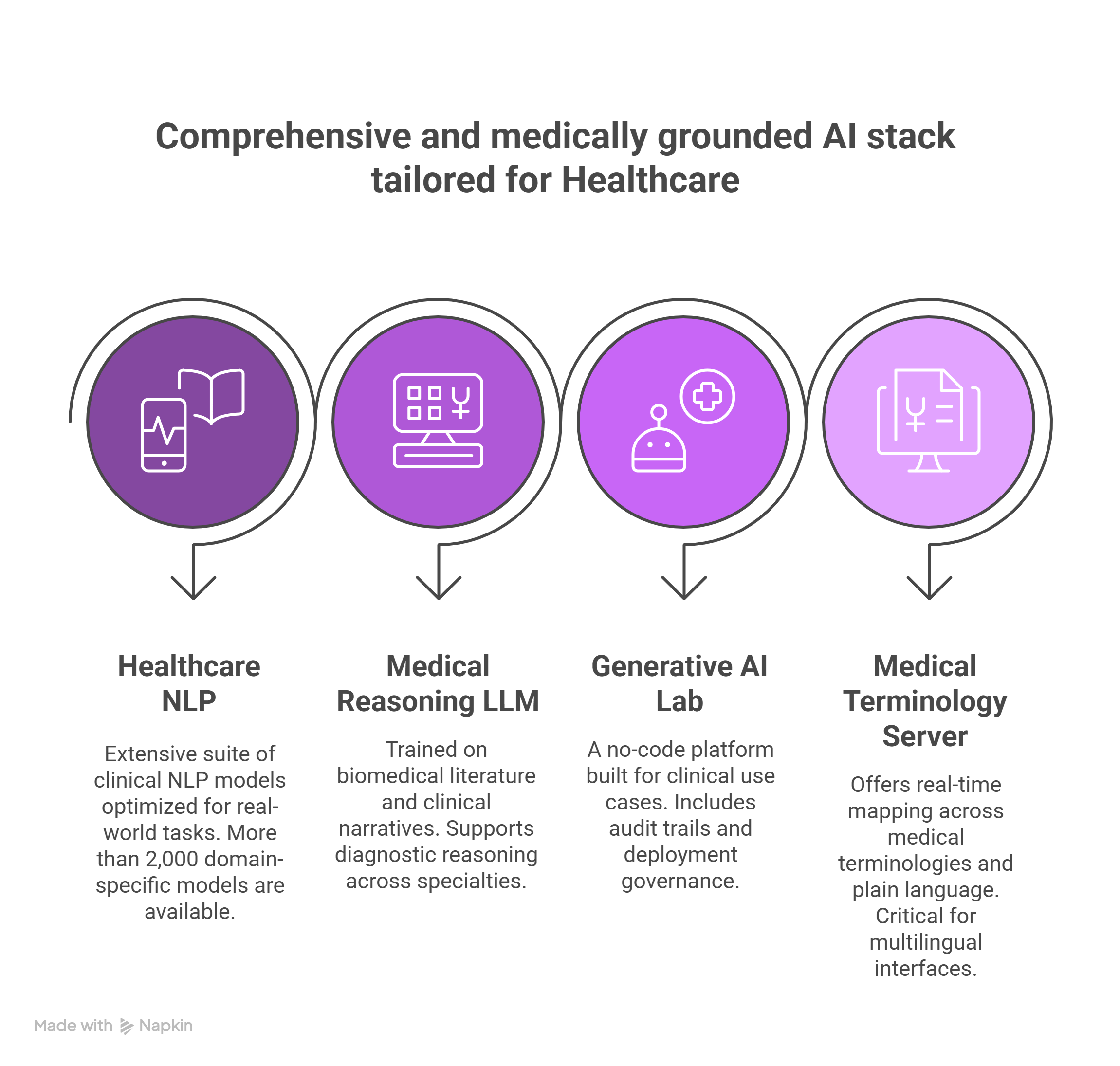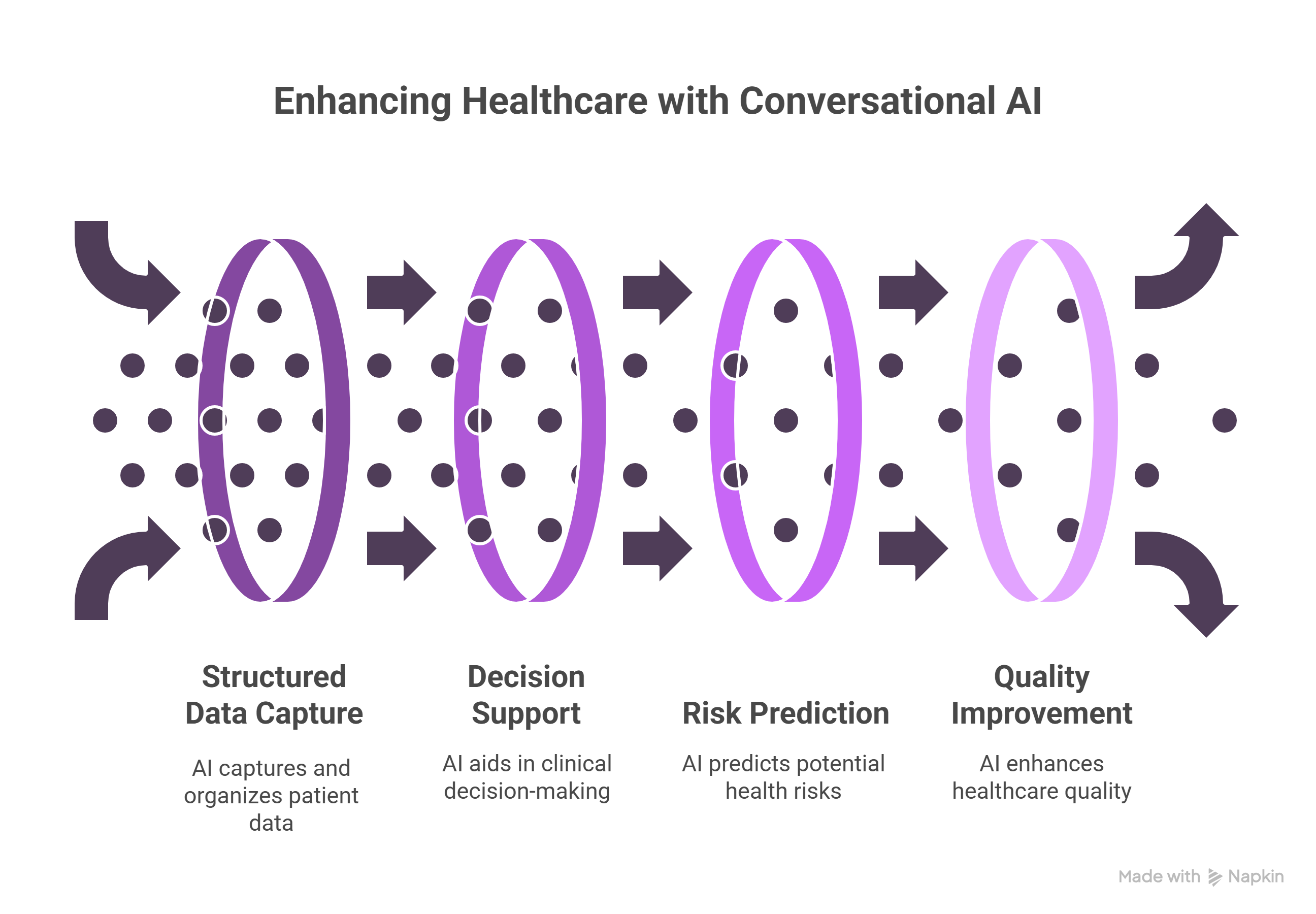Conversational AI is redefining how patients engage with healthcare. Evolving far beyond basic chatbots, today’s AI-driven systems can interpret clinical language, capture structured histories, triage symptoms, and deliver ongoing support. When powered by medically trained language models, these agents become valuable collaborators in both diagnostics and continuous care.
John Snow Labs stands at the forefront of this shift, offering a trusted technology stack that supports diagnostic accuracy, scalable patient engagement, and compliant deployments in real-world healthcare environments.
How can AI tackle diagnostic complexity in healthcare?
Diagnostic errors contribute to approximately 10% of patient deaths in the United States1, a rate that has persisted despite significant advances in imaging, testing, and clinical education. Many of these errors stem from incomplete patient histories, communication gaps, and decision-making under time pressure.
Conversational AI offers a structured and scalable solution. Intelligent agents can prompt patients for detailed symptom descriptions, ask context-aware follow-ups, and generate structured summaries aligned with medical terminology. John Snow Labs’ Healthcare NLP platform supports these capabilities with over 2,000 pre-trained models specifically designed for clinical and biomedical contexts. These include named entity recognition for symptoms and conditions, negation detection, temporal resolution, and relationship extraction, all essential for capturing diagnostically relevant insights from unstructured patient input.
The Medical Reasoning LLM, designed by John Snow Labs for clinical deductive and inductive reasoning, further augments this process. Evaluating hypotheses, weighing evidence, and referencing medical literature, it offers clinicians a structured summary of possible conditions, supporting informed decisions without overstepping professional judgment.
How does AI enable patient support that scales with demand?
Outside clinical encounters, conversational AI helps bridge the gap between visits. Patients managing chronic conditions or recovering from procedures often need reassurance, clarity, and timely responses, needs that human staff alone cannot always meet.
Generative AI Lab, John Snow Labs’ no-code platform, enables healthcare organizations to build, validate, and deploy conversational agents that monitor symptoms, explain care plans, and flag warning signs. These agents adapt their responses to the patient’s literacy level and language. Responses are generated in a secure, traceable environment designed for HIPAA and GDPR compliance.
When patients mention side effects or worsening symptoms, the system can escalate cases by automatically generating structured clinical notes or alerts. Human-in-the-loop validation ensures clinicians can review and adjust outputs before integration with care pathways, maintaining trust and oversight.
What makes an AI system suitable for clinical environments?
John Snow Labs provides a comprehensive and medically grounded AI stack tailored for healthcare:
- Healthcare NLP, the industry’s most extensive suite of clinical NLP models, with more than 2,000 domain-specific models optimized for real-world tasks such as de-identification, diagnosis classification, and temporal resolution.
- Medical Reasoning LLM, uniquely trained on biomedical literature and clinical narratives, capable of supporting diagnostic reasoning across specialties.
- Generative AI Lab, a no-code platform purpose-built for clinical use cases, with built-in audit trails, deployment governance, and human-in-the-loop capabilities.
- Medical Terminology Server, offering real-time mapping across SNOMED CT, ICD-10, CPT, LOINC, RxNorm, and plain language expressions, critical for multilingual and literacy-aware interfaces.

What are the most promising use cases for conversational AI in healthcare?
While concrete implementations are evolving, the capabilities John Snow Labs offers are highly aligned with needs in areas like virtual triage, oncology navigation, and behavioral health monitoring. In these scenarios, AI agents can support early identification of high-risk symptoms, improve adherence to care plans, and deliver targeted education, all without overwhelming care teams.
These are logical extensions of the technology’s current use, though direct documentation of such deployments is still emerging. John Snow Labs continues to work with partners to validate and refine these applications in production environments.
How does responsible AI design ensure trust and compliance in healthcare?
Beyond functionality, deployment in healthcare requires trust. Every component of John Snow Labs’ platform from its language models to its de-identification tools is designed for regulated environments. Compliance with HIPAA and GDPR is built-in, with additional support for custom security and governance needs.
Bias mitigation and model transparency are also central to the company’s approach. All AI outputs can be traced, audited, and adjusted via Generative AI Lab, ensuring clinicians remain in control. For organizations working toward equitable and ethical AI, these safeguards are essential.
How will conversational AI evolve to meet future healthcare challenges?
As conversational AI becomes more integrated into clinical systems and care delivery platforms, it has the potential to enhance diagnostic accuracy and patient satisfaction. By facilitating structured data capture, these tools can feed decision support engines, risk prediction models, and quality improvement initiatives transforming routine interactions into sources of clinical insight.
John Snow Labs equips healthcare teams with the infrastructure to deploy this technology responsibly and effectively. By embedding clinical intelligence into every conversation, we help organizations improve care without adding an administrative burden.

To explore how our Healthcare NLP, Medical Reasoning LLM, and Generative AI Lab can support diagnostic and patient-facing applications in your organization, visit our Healthcare NLP solution page or request a personalized demo.
References:
[1] Institute of Medicine, Improving Diagnosis in Health Care. Washington, DC: The National Academies Press, 2015. [Online]. Available: https://www.ncbi.nlm.nih.gov/books/NBK338586/






























